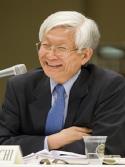
Biography:
Born in Tokyo in 1943. Tomihiro Taniguchi joined the Ministry of International Trade and Industry (MITI) in 1968, immediately after his graduation from the University of Tokyo, where he majored in nuclear engineering. During his distinguished career of 30 years at MITI, as Director and Deputy Director, he was involved in a wide range of policy and administration regarding science, technology, innovation, energy and industry, and consistently contributed to the establishment and development of a regulatory regime in order to enhance efficiency and safety in the area of nuclear energy utilization. In the 90s, as Deputy Director General in charge of nuclear policy, he was the Japanese Government's chief administrative officer on all aspects of commercial use of nuclear energy and contributed to the establishment of the Nuclear and Industrial Safety Agency (NISA). Tomihiro Taniguchi served in a number of important positions at international organizations, including OECD Deputy Director for S&T and Industry, IEA Director of Oil Market and Emergency Preparedness, and also participated in the establishment of the International Energy Agency (IEA). From 2001 to 2010, he worked as Deputy Director General and the Head of Department of Nuclear Safety and Security of the International Atomic Energy Agency (IAEA). Among numerous noteworthy achievements during these nine years, he fundamentally revised the whole suite of IAEA Safety Standards and established new IAEA Security Guidance Documents, based on which he initiated a series of IAEA Advisory and Peer Review Services. In the same period, he served as the Vice Chair of the Intergovernmental Panel on Climate Change (IPCC) for its Third Review, and was also part of the IAEA group and the IPCC group, which were awarded the Nobel Peace Prize in 2005 and 2007, respectively. In March, 2011, Tomihiro Taniguchi was named Executive Director of the Science and Technology in Society (STS) forum and in April, also appointed as professor of the Tokyo Institute of Technology.
Abstract:
Fossil Fuel Availability and Future of New and Renewable Energy
1. STS forum and RACC activities in energy and environment
2. Resource constraints of global fossil energy supply
3. Technical and environmental constraints of fossil energy
4. Economic competitiveness and innovation of fossil energy
5. Strength and weakness of new and renewable energy
6. Solar energy (photovoltaic and thermal)
7. Wind energy
8. Biomass energy
9. Waste energy
10. Geothermal energy
11. Ocean energy (wave, tide and O-TEC)
12. Energy storage
13. Grid management and investment
14. Integration and optimization with large base load power
15. Smart city, smart energy infrastructure and new urban and regional development
16. Innovation for internet of energy and on-demand economy
17. Financing, risk management and support measures (funding, tariff and regulation)
18. Human and industrial capacity building and research and education networking
19. Opportunities and challenges for new and renewable energy in developing countries
20. New and renewable energy for global sustainable development